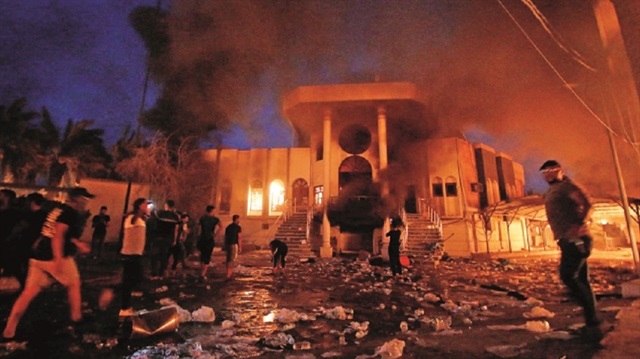
The power struggle between Iran and Saudi Arabia has sparked internal conflict in Iraq, which has yet to agree on a government, engulfing the country in protests that have resulted in death and violence.
The international community is worried about the protests that began in Baghdad spreading across the country.
As Iraq’s and Syria’s territorial integrity are on the top of Turkey’s agenda, it has been ascertained that Ankara should take action to soften the crisis, send delegations to the region and take urgent measures in Iraq.
Since July 9, Iraq’s Shia-majority central and southern provinces -- especially Basra -- have been rocked by protests to demand better public services, more job opportunities and an end of government corruption.
Tension between Shi’ite Iran and Saudi Arabia’s conservative Sunni monarchy has run high in recent years. The two countries have backed opposing forces in wars across the Middle East, usually along sectarian lines.
Since Saddam Hussein was toppled in a 2003 U.S. invasion, power has been shared among Iraq’s three largest ethnic-sectarian components. The prime minister is a Shi’ite Arab, the speaker of parliament a Sunni Arab and the president a Kurd.

The crisis comes at a time when politicians still have not agreed on a government after an inconclusive election in May. The new parliament met for the first time on Monday, but failed to elect a prime minister or even speaker.
Iraqi experts and army officials are worried about a civil war breaking out in the country after thousands of militias were dispatched to the region.
For more than two months, the results of Iraq’s hard-fought parliamentary polls had remained the subject of a bitter dispute amid widespread allegations of voter fraud.
According to the results, Shia cleric Muqtada al-Sadr's Sairoon Coalition won 54 parliamentary seats, followed by a Hashd al-Shaabi-led coalition (47 seats) and Prime Minister Haider al-Abadi's Victory Bloc (42 seats).
Parliament convened an emergency session on Saturday to discuss the crisis in Basra and the current prime minister, Haider al-Abadi, warned that the situation could descend into armed conflict.
“Politics should be separated from security and services,” he said.
At least 30 protesters have reportedly been killed -- and scores more injured -- in clashes with security forces since the beginning of the conflict.
In recent days, protesters have torched government and political party headquarters as well as the Iranian consulate.
Turkey’s counter-terrorism operations in northern Iraq and the new Ovaköy project which enhanced ties between Ankara and Baghdad disturb Western countries.
The Ovaköy border gate project is an alternative to the Ibrahim Khalil (Habur) border crossing located between Turkey and the Kurdish region in northern Iraq, and will cut off the U.S. weapons supply to the Kurdistan Workers’ Party (PKK) terror group.
Turkey's Ambassador to Baghdad Fatih Yıldız is a key factor in relations with his diplomatic efforts, closely following the developments, and is in constant contact with Baghdad.
Since the beginning of the conflict, Turkey conveyed messages of support to Iraq, saying that it was ready to help.
“Turkey is ready to assist Iraq in water management and agricultural irrigation,” Yıldız said in August.
On the other hand, the Turkish Consulate-General in Iraq's southern city of Basra, which was closed for security reasons in 2014, is considered to be reopened in near future.


















